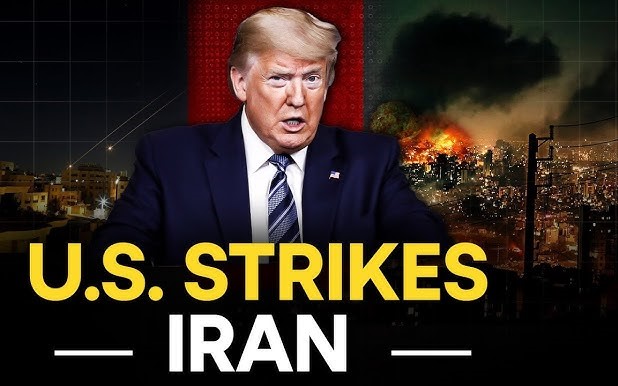The United States launched a coordinated military strike against Iran in the early morning hours of June 22, 2025 (local Iran time), targeting key nuclear enrichment facilities in Fordow, Natanz, and Isfahan. According to the U.S. Department of Defense, the operation involved B-2 stealth bombers and Tomahawk cruise missiles, aiming to “cripple” Iran’s nuclear capabilities. Former President Donald Trump, who has been closely involved in the recent administration’s foreign policy decisions, praised the mission as a “spectacular success,” claiming Iran’s nuclear infrastructure has been “completely and totally obliterated.”
While full details are still developing, satellite imagery and independent military analysts have confirmed that significant damage was inflicted on at least three sites. In his statement, Trump warned Iran that “any retaliation will be met with force far greater,” drawing mixed reactions across the globe. Israel’s Prime Minister Benjamin Netanyahu welcomed the strikes as a “necessary step,” while the United Nations and several U.S. lawmakers voiced concern over the absence of congressional approval and the potential for a major international escalation.
Iran has yet to announce an official response, though security analysts warn that retaliatory action is highly likely. The most probable targets would include U.S. military installations in the Middle East, including bases in Iraq, the United Arab Emirates, Bahrain, and potentially assets in Israel.
In the wake of the strike, law enforcement agencies across the U.S. have heightened security around sensitive locations, particularly in major cities like New York, Los Angeles, and Washington, D.C. The NYPD has increased patrols near Jewish schools, synagogues, embassies, and other potential soft targets amid concerns that Iran or affiliated groups might seek to incite violence or unrest within American borders.
Federal officials also issued internal bulletins warning of the potential for cyberattacks against critical infrastructure, including energy grids, financial systems, and government agencies. Private businesses are being advised to reinforce cybersecurity protocols and remain vigilant for phishing scams or ransomware threats that may be state-sponsored.
While there is no current intelligence indicating an imminent attack within U.S. borders, certain groups and regions have been urged to stay particularly cautious:
-
Jewish communities and institutions: Due to increased threats from groups aligned with Iran and recent incidents of antisemitic rhetoric, Jewish schools, synagogues, and community centers in states like New York, New Jersey, Florida, and California have been advised to implement enhanced security protocols.
-
Military families and personnel: Individuals with loved ones deployed overseas or stationed at U.S. bases abroad should remain aware of potential developments and follow updates from the Department of Defense.
-
International travelers: Americans currently in or planning to travel to the Middle East should register with the State Department’s Smart Traveler Enrollment Program (STEP) and avoid high-risk regions until tensions ease.
Americans are advised to take basic precautions to ensure their safety in the event of domestic repercussions or retaliatory attacks:
-
Stay Informed: Follow local news, official government alerts, and updates from the Department of Homeland Security.
-
Report Suspicious Activity: If you see something unusual—such as unknown individuals taking photos of secure buildings or vehicles lingering around sensitive areas—contact local law enforcement immediately.
-
Be Cyber Vigilant: Keep software and security systems updated, and avoid clicking on unfamiliar links or downloading unsolicited attachments.
-
Have an Emergency Plan: Know your city’s evacuation procedures and ensure your family knows what to do in case of a sudden alert or event.
-
Avoid Spreading Misinformation: Stick to official sources and be wary of unverified social media posts or politically motivated disinformation campaigns.
This strike marks a dramatic turning point in U.S.–Iran relations and presents serious risks of escalation throughout the region and potentially beyond. Whether this move deters future aggression or ignites a wider conflict remains to be seen, but the immediate priority for U.S. residents is to stay alert, remain calm, and follow official instructions as more information unfolds.
For now, the eyes of the world remain fixed on Tehran’s next move—and America’s readiness to respond.
